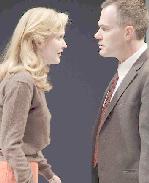REVIEWS
FEATURES
Off-Broadway
Berkshires
London
California
New Jersey
DC
Philadelphia
PLAYWRIGHTS' ALBUMS
>FILM
LINKS
MISCELLANEOUS
Masthead
Writing for Us
A CurtainUp Review
Tea and Sympathy
By Elyse Sommer
|
You have to be an interested bystander. . .all you're supposed to do is every once in a while give the boys a little tea and sympathy.— Bill Reynolds reminding his wife Laura of the advice she was given by the Headmaster's wife when she first arrived at the boarding school as a faculty wife Years from now, when you talk about this, and you will, be kind.—Laura, throwing the advice of the Headmistress to the wind in what's very much a case of famous last words. |
  Heidi Armbruster & Craig Mathers as Laura and Bill Reynolds, and Dan Mc Cabe as Tom Lee
|
And so, Tea and Sympathy became a huge hit, setting a record for any Playwrights' Company production with 712 performances. Kerr went on tour with the play and she and her colleagues also starred in the 1956 MGM film (directed by Vincent Minelli and scripted by Anderson) —but not before several adjustments were made to make the homosexual references as well as the final seduction pass the rigid Hollywood Production Code of 1930.
What was shocking in 1953 became less and less so over the years so eventually the play moved into the realm of community theater and then into the never never land of rarely if ever produced plays. So why try to revive this over fifty year old play? Because it is exactly this sort of seemingly dated play, like The Voice of the Turtle and The Hasty Heart, whose more enduring qualities have been previously revealed by the Keen Company.
As the playwright himself stated when Tea and Sympathy premiered, he had more on his mind than the sexual angle. Tom's being accused of being a "fairy" was just a means for getting at the real theme: judging people based on stereotyping, the rule of conformity that fostered a slavish adherence for maintaining one's standing as part of the " in" crowd. Tea and Sympathy's aura of a narrow little world where someone like young Tom, who did not conform to the school's predominant ethos of guy-hood was easily scapegoated on the basis of unsubstantiated information also reflects the Senator Joe McCarthy era during which it takes place.
As the Keen production makes no attempt to update the script, it also doesn't expend any special effort to create a set soaked in 1950s atmosphere (the exception being an old phonograph that seemingly plays records of the period before curtain time). Instead Beowulf Borritt and Jo Winiarski have created an airy, utilitarian split level set to take us back and forth between the Reynolds' sitting room and Tom Lee's bedroom. It's almost as if director Jonathan Silverstein had opted for this generic and non period specific look to emphasize that, shifting mores and attitudes notwithstanding, the story you're watching has many timeless aspects: the plight of youngsters who for one reason or another fit in with the majority, and whose sense of isolation is not helped by insensitive parents and teachers. . .the dilemma of those who do fit in and have decent instincts but who aren't strong enough to resist parental and peer pressure for conformity. . . and holiday romances (Bill Reynolds and the wife he met in Italy during a sabbatical) that turn sour when real life reveals personality traits not seen in the first flush of love.
Naturally, being true to the original play, means that the question about Tom's sexual orientation and the homophobia rampant at the time are stirred into this thematic mix. Contrary to the advice the Headmaster's wife gave Laura Reynolds along with the welcoming gift of a teapot ("You have to be an interested bystander. . .all you're supposed to do is every once in a while give the boys a little tea and sympathy"), Laura becomes a deeply involved in the tempest stirred up when news that Tom and another teacher were seen swimming near the dunes without their clothes on spreads through the school. The teacher is fired. Tom, already a loner because of his unmanly interest in music and drama, becomes a pariah facing explusion. Being a sexual innocent, he becomes dangerously and self-destructively confused about who he really is. Laura is less ready to jump to everybody else's conclusions about the boy who reminds her of her eighteen-year-old first husband who felt he had to prove his manhood and consequently got himself killed in World War II. Her concern for Tom drives a wedge into her already troubled marriage to the macho Bill even though, as her final act of kindness proves, she considers helping Tom feel like a man is as much for herself as the boy — and makes you wonder how she would have reacted if Tom had turned out to really be gay.
The delicate relationship between Laura and Tom demands performances on a par with Deborah Kerr and John Kerr (no relations) who created the roles. Heidi Armbruster and Dan McCabe fill their shoes admirably. Armbruster, a lovely, slim blonde, seems a bit young for the part but she handles it with the required depth of feeling. Dan McCabe, isn't movie star handsome, but has a wonderful, gawky charm and as directed by Silverstein their connection is clear and natural without any heavy telescoping.
With the Laura/Tom relationship so gentle and nuanced, Bill is bound to come across as the heavy and Craig Matthews doesn't try to make him more likeable. However, perhaps because he isn't a brawny six-footer, he does make him an interestingly dimensional character — a sort of corporate striver whose sojourns with the boys are less about his enthusiasm for the great outdoors than his ambition for moving up the boarding school ladder and his homophobic behavior stemming from an inability to unleash his touchy-feely side to anyone.
The rest of the cast does just fine, though Brandon Espinoza stands out as Tom's conflicted roommate, especially in a scene where he tries to teach him to walk with more of a he-man strut. Dan Cordle also has some standout moments s as Tom's prideful, misguided and ultimately frustrated and at sea father
It's always nice to see that the so-called out-of-date dramas of the well-made play era still have plenty of emotional resonance. And it's wonderful that young companies like the Keen are keen enough about the best of
| Tea and Sympathy By Robert Anderson Directed by Jonathan Silverstein Cast: Heidi Armbruster (Laura Reynolds), Dan McCabe (Tom Lee), Craig Mathers (Bill Reynolds); also Dan Cordle (Herb Lee), Randy Danson (Lilly Sears -- substitute at press performance: Kathy Kaefer), Brandon Espinoza (Al), Hal Fickett (Phil), Ben Hollandsworth (Steve), Jake Levy (Ralph), Mark Setlock (Harris). Sets: Beowulf Boritt & Jo Winarski Costumes: Theresa Squire Lights: Josh Bradford Sound: Daniel Baker Running Time: 2 hours and intermission. Keen Company at the Clurman Theater, 410 West 42nd Street, (between 9th and 10th Avenues) 212-279-4200 From 3/06/07 to 4/14/07; opening 3/15/07 Tuesday at 7 PM, Wednesday — Saturday at 8:00 PM and Sunday at 2:00 PM Tickets: $40 Reviewed by Elyse Sommer on March 13th |

Easy-on-the budget super gift for yourself and your musical loving friends. Tons of gorgeous pictures.

Leonard Maltin's 2007 Movie Guide

At This Theater
Leonard Maltin's 2005 Movie Guide

 >
>

